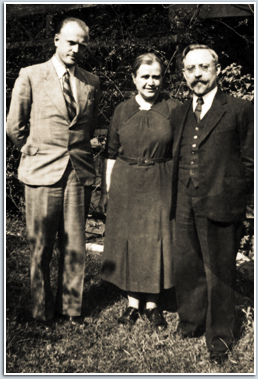He did not read the Bible. It was kept in the Orthodox Church. Its cover was kissed in worship, but it was not read by the people. To him, as well as to all the intelligentsia, it was a book of fables, invented by the priests to assist the Czar's rule of Russia. The word of the Czar was the rule of the church. The church and state worked hand in hand, so that the priests often acted as policemen, and the confessional was used by the Czar's secret spy system. What about the believers (Baptists)? There were a few of them, but all were simple folk. This cultured young man had no confidence in their judgment. Yet, the seeking soul is never left long in the darkness. If there is no one willing to be sent by God, He himself will rend the heavens and come down. After two and a half years of searching, Professor Neprash began to perceive God through a scientific book of astronomy. |
Dr. Ivan Neprash with his wife and son
|
The choice lay between hypocrisyand madness. It could be neither. Stubborn rebellion rose in his soul against the idea of a higher authority. But at length he faintly admitted to himself that perhaps a Superior Being does exist. The Holy Spirit took that "perhaps" and began to work. One afternoon, the assurance of the existence of a Creator filled his consciousness. His peace was soon disturbed by a question. If the Creator fixed definite laws for the motions of the heavenly bodies, would he leave human beings without them? “No,” said reason. “What are these laws? The heavenly bodies follow certain fixed courses and therefore swing with ease through space with never a collision. There must be principles governing one’s life! Only I do not know them. My diary, with its records of success and failure, proves that my life has not yet found its true course.” In his perplexity, he cried out, “How can I learn the plan for my life? What rules govern it?” Naturally, at this period the great idealist Tolstoy, the higher critic of Russia, appealed to him. The heart of his philosophy is, “Love thy neighbor as thyself.” What an ideal! It seemed beautiful. Gladly and earnestly, he set about filling his soul with love. Surely, this must be the ultimate good. If it is, it will not fail! But alas! It did fail, even when it was practiced in all sincerity. Though all looked empty, inside and outside, he went plodding on, even though an endless road seemed to open before him. As the Russian proverb says, "The deeper one goes into the forest, the more trees there are!" |
|

